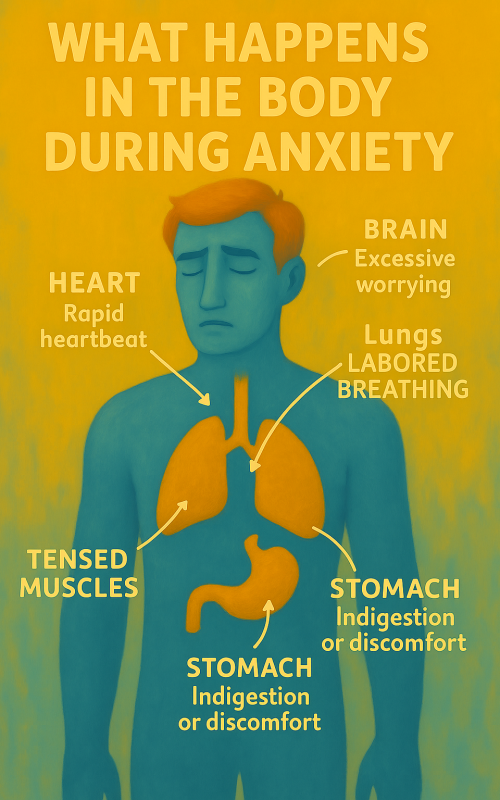450 E 96th St, #500, Indianapolis, IN 46240
450 E 96th St, #500, Indianapolis, IN 46240

Feelings of stress and worry are normal. When the feelings are stronger than the stimulus requires, or if they last after a cause is no longer a concern, it is time to seek help. Hypnotherapy can be an effective treatment in reducing feelings of anxiety. Hypnosis works to change the thoughts and feelings associated with the root of the anxiety.
Anxiety is a natural response to uncertainty or change. It’s the body and mind’s way of preparing us for something unusual or potentially threatening. In small doses, it can sharpen focus and enhance performance — think of the nervous energy before an interview, test, or big decision.
But when anxiety becomes chronic or overwhelming, it stops being helpful and starts interfering with daily life.
At Hoosier Hypnosis, we help you get to the root of that anxious loop — not just managing symptoms, but changing your unconscious response to stress and worry so you can regain a sense of calm and control.
When you feel anxious, your body enters a state of “fight or flight.” Stress hormones like adrenaline and cortisol flood the system, speeding your heart rate and heightening awareness. This can be useful in short bursts — like navigating a high-pressure moment or avoiding danger.
However, if your body remains in this state too often or for too long, the effects become harmful. Chronic anxiety can lead to:
Fatigue
Burnout
Irritability
Muscle tension or headaches
Heart issues
Over time, it’s exhausting to live in a state of constant alert.
And if left untreated, anxiety can develop into feelings of hopelessness or even depression.

Anxiety becomes an issue when it:
Feels constant or uncontrollable
Interferes with relationships, work, or sleep
Causes physical symptoms like shortness of breath, dizziness, or panic attacks
Makes it hard to enjoy daily life or feel safe even in routine situations
This is more than “being stressed.” It’s a chronic overactivation of your survival system — and it’s something you can learn to regulate.
Anxiety doesn’t look the same for everyone. Here are a few common patterns:
Worry feels constant — about finances, health, family, or even vague future concerns. It can be hard to “turn off” the brain and relax, even when things are going well.
Panic strikes suddenly and often without clear warning. Episodes may include racing heart, chest tightness, dizziness, and a sense of doom. The fear of having another panic attack can be just as debilitating as the attack itself.
Social situations — like meeting new people or speaking in public — feel overwhelming. You may fear being judged, criticized, or looked at, even when there’s no real danger present.
We also support clients struggling with:
Performance anxiety (tests, public speaking, sports)
Phobias and avoidance behaviors
Health-related anxiety or obsessive thoughts
Hypnosis helps calm the overactive unconscious responses that fuel anxiety. In a relaxed, focused state, your mind becomes more receptive to calming suggestions, positive reconditioning, and new coping strategies.
With hypnosis, we help you:
Break free from anxious thought loops
Reduce the frequency and intensity of symptoms
Build confidence and emotional regulation
Respond to stress without spiraling
Create habits that support relaxation and mental clarity
Sleep better, breathe easier, and feel more present
Unlike medications, hypnosis doesn’t just mask symptoms — it helps you change the pattern from the inside out.
Want to learn how this works? Explore how hypnosis works or read about our stress reduction services.
Hypnosis can help to induce a state of deep relaxation, which can reduce muscle tension and lower overall stress levels.
Hypnosis can help to change negative thought patterns and beliefs that may be contributing to anxiety and stress. This can help to improve a person's overall outlook and reduce feelings of anxiety and stress.
Hypnosis can help to change behaviors that may be contributing to anxiety and stress. For example, a person may be taught self-hypnosis to use when they feel anxious or stressed, which can help to reduce those feelings.
Hypnosis can help a person to develop new strategies for coping with stressors, so they can handle difficult situations more effectively, which can reduce overall stress and anxiety levels.
Hypnosis works by inducing a state of deep relaxation and concentration, which allows a person to focus on positive thoughts and suggestions. This can help to change a person’s thought patterns and behaviors, which can reduce stress and anxiety.
Yes, hypnosis can help with stress and anxiety. It can help a person to relax, reduce their stress levels and manage their anxiety.
The benefits of using hypnosis for stress and anxiety include reduced feelings of stress and anxiety, improved mood and mental well-being, and better ability to cope with stressors.
Most people can be hypnotized, but some may find it more difficult than others. Factors such as a person’s level of suggestibility and willingness to be hypnotized can affect the success of hypnosis.
The length of time it takes for hypnosis to be effective for stress and anxiety can vary depending on the person and the specific issues they are dealing with. Some people may see results after one session, while others may need multiple sessions to see significant changes.
The number of sessions needed for hypnosis for stress and anxiety can also vary depending on the person and the specific issues they are dealing with. Typically, 3-4 sessions are recommended for people who are dealing with chronic stress and anxiety.
Hypnosis is generally considered safe, but it’s important to work with a qualified hypnotherapist.
The most common side effects of using hypnosis for stress and anxiety include a sense of relaxation and calm, improved ability to cope with stressors, an increased sense of control over emotions and thoughts, and a generally improved overall well-being.


